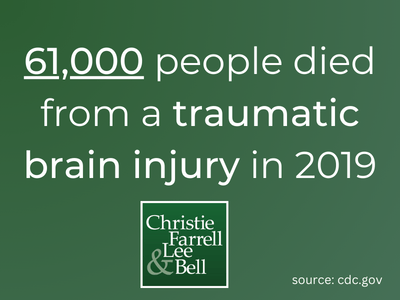Indianapolis Traumatic Brain Injury Lawyer
Helping people is our priority



Since 1993

Recovering Damages for Seriously Injured Indiana Clients
If you’ve received a traumatic brain injury in Indianapolis, you can turn to the experienced lawyers at Christie Farrell Lee & Bell for legal representation. Having fought for the rights of seriously injured victims throughout Indiana since 1993, we know how to navigate your legal claim and improve your chances of recovering financial compensation.
Some people associate head injuries with minor concussions, but in a major accident, a person’s head can be jolted or penetrated in a variety of ways that lead to more severe injuries and sometimes, permanent brain damage. These traumatic brain injuries, or TBIs, can lead to permanent impairments, loss of sensation, and more, all of which can have an impact on your quality of life.
Because your brain is responsible for so much of your movements and bodily functions, any injuries or harm that comes to it must be taken seriously.
Speak with a personal injury lawyer today. Call: 317-488-5500
What Is a Traumatic Brain Injury (TBI)?
Within personal injury law, head injuries are usually referred to as “TBIs,” which stands for traumatic brain injuries. A TBI is typically caused by a blow, jolt, or bump to the head that temporarily or permanently disrupts your brain function. TBIs can range in severity depending on how hard your head was struck, or whether your skull was penetrated or not. The most common mild type of TBI is a concussion, which can briefly disrupt your consciousness. If you ever experienced a concussion in childhood or watched a movie involving one, you may be familiar with the medical suggestion to not fall asleep with a concussion.
However, many TBIs are severe enough to lead to permanent disability or death and are classified as catastrophic injuries as a result. According to the Centers for Disease Control and Prevention, 61,000 people died from a traumatic brain injury in 2019 alone.
Examples of serious TBIs and complications to be aware of include:
- Contusions: Bruises to the brain tissue are called contusions, which can occur when your brain is directly impacted in an accident. Some are minor, but severe contusions can cause swelling in the brain and prevent proper oxygenation.
- Hypoxic brain injuries: This injury occurs when your brain doesn’t receive enough oxygen in accidents such as near-drownings or exposure to carbon monoxide or toxins. As a result of the lack of oxygen, the brain can be permanently damaged.
- Brain hemorrhage: Hemorrhages refer to internal bleeding that can result from high-force impacts and are also known as strokes when they occur in the brain. This is a common injury that a person can experience when they fall on their head or their head is hit by a flying object.
- Skull fractures: Severe traumatic brain injuries often result in a broken, crushed, or cracked skull. If not treated quickly, this type of injury can lead to infection, pressure on the brain, or leaking cerebral spinal fluid.
- Cerebral Edema: Swelling of the brain.

Complete a Free Case Evaluation form now
Damages We Recover From a Traumatic Brain Injury in Indianapolis
At our law firm, our Indianapolis brain injury lawyers have over 120 years of combined experience handling serious injury claims, including TBI claims. We know that brain injuries can prevent a person from talking, moving, or forming memories, all of which are traumatic consequences that will likely change your future. Because of that, you might be entitled to compensation in a claim.
These injuries tend to lead to major financial setbacks for victims. If you have to be hospitalized for your brain injury, or an axonal injury, you’ll be footed with hefty medical care and deal with missing days or weeks of work. If you or a loved one can no longer take care of themselves, you may have to consider hiring a full-time nurse or caretaker. The costs add up, but you shouldn’t bear the weight of another person’s mistake. Whether you were harmed by a drunk driver or a negligent property owner, you can expect us to get to the bottom of your accident and get the compensation you are entitled to receive.
A personal injury lawyer can help you pursue compensation for a wide range of damages, including:
- Medical bills and medical treatments
- Pain and suffering
- Lost wages and other income
- Lost earning capacity
- Emotional distress
- In-home care
- Physical therapy
- Loss of consortium
- Wrongful death (if a loved one died due to a TBI)
It’s important to know, if your injury was caused by someone else’s recklessness or negligence, you may be able to pursue punitive damages. In Indiana, punitive damages are designed to punish a wrongdoer for their egregious behavior and deter others from similar actions in the future.
If you want to pursue action against a liable party or insurance company, please call our Indianapolis traumatic brain injury attorneys today for a free case evaluation.
How Does a TBI Affect Your Brain?
Traumatic Brain Injury (TBI) is a serious injury to the brain that can have long-term, life-altering effects. TBIs are caused by a sudden blow or jolt to the head or body, or a penetrating head injury that disrupts normal brain function. Causing physical pain and long-term effects, a TBI can actually tear the lining, tissue, and blood vessels inside the skull.
Click to contact us today
How TBIs Occur in Accidents
Motor vehicle accidents such as car collisions, or heavy vehicle accidents are among the most common causes of traumatic brain injuries in the United States – more than 6 million car crashes occur every year and injure millions of drivers and passengers alike, as well as bicyclists and pedestrians. Head-on collisions specifically can lead to TBIs because the accident involves two cars colliding with one another from the front. Drivers can injure their heads when the impact of a collision sends their head flying against their window or wheel, or when their cars roll over.
Individuals can also receive severe brain injuries when they fall. Slip and fall accidents are a common type of premises liability claim and can occur anywhere for a variety of reasons, whether the floor is wet or slippery or an office’s carpeting is torn. TBIs can be fatal or lead to permanent brain damage when a person falls from a building or down a flight of stairs.
TBIs can involve a variety of common symptoms that impair our ability to feel, think, and even communicate. Some sensory symptoms include blurred vision or sensitivity to sound, while cognitive symptoms can include loss of memory, depression, or difficulty in forming sentences.
Other common causes of TBI include a slip and fall accident, sports injuries, pedestrian accidents, nursing home abuse, collisions involving a motorbike, workplace accident, negligent medical care, and physical violence.
Legal Process and Timeline for TBI Claims
Pursuing a TBI claim involves several critical steps to ensure that victims receive the compensation they deserve:
- Initial Consultation:
- Assess the case and receive legal advice from a personal injury lawyer. This meeting helps determine the viability of the claim and outlines the potential legal strategies.
- Investigation Phase:
- The lawyer gathers evidence, interviews witnesses, reviews medical records, and consults with medical experts to build a strong, evidence-based case. This step is crucial for establishing liability and the extent of the injury.
- Filing a Lawsuit:
- Submit necessary documentation within legal deadlines to formally initiate the lawsuit. This includes filing a complaint outlining the details of the injury, the negligence involved, and the damages sought.
- Settlement Negotiations:
- Both parties engage in negotiations to reach a fair compensation agreement without going to trial. This step can involve mediation or direct negotiations and often aims to resolve the case more quickly and amicably.
- Trial Process:
- If a settlement is not reached, the case proceeds to trial. During the trial, both sides present their evidence and arguments, and a judge or jury determines the outcome based on the merits of the case. This stage can be lengthy and complex, but it ensures that all aspects of the case are thoroughly examined.
The entire process can vary in duration depending on the complexity of the case, the cooperation of involved parties, and court schedules. Having an experienced Indianapolis personal injury lawyer can help navigate these steps efficiently and effectively, maximizing the chances of a favorable outcome for the TBI victim.
Contact our Traumatic Brain Injury Attorney Today
If you were a brain injury victim, please contact us at 317-488-5500 to schedule a free consultation. Our Indianapolis traumatic brain injury attorneys at Christie Farrell Lee & Bell have over 120 years of combined experience and can assist you in seeking maximum financial compensation for injuries caused by negligent individuals or entities. We will provide you with honest legal advice and legal strategies.
Our law firm handles serious injury cases – it’s not one thing we do, it’s all we do. We want to help our Indiana clients get the justice they deserve because “it’s all about justice.” Our Indiana traumatic brain injury attorneys are committed to advocating for those who have suffered severe injuries, ensuring they receive the compensation and support they need during such challenging times.
Indianapolis Office
951 N Delaware St Indianapolis, IN 46202
Phone: 317-593-9202

Get a FREE Case Review
Schedule Your Free Consultation















